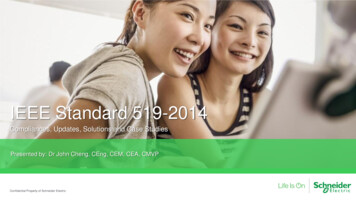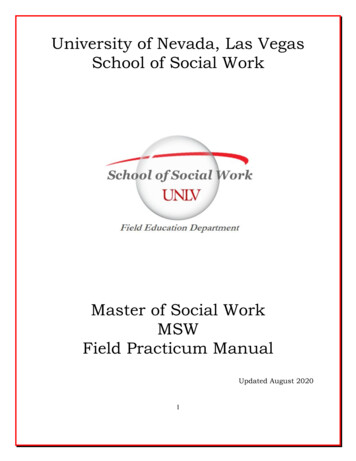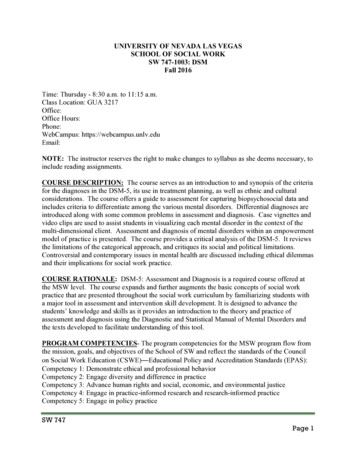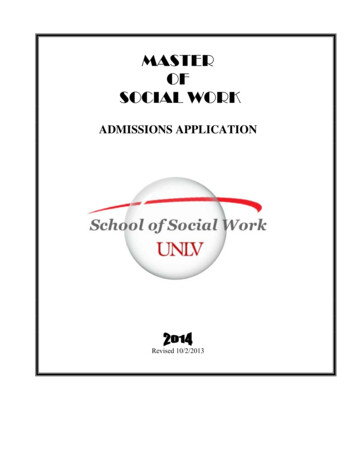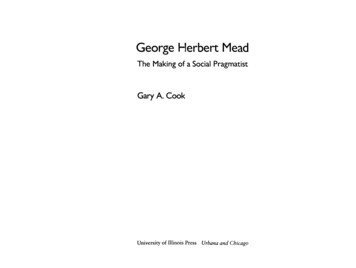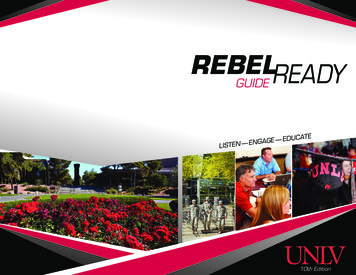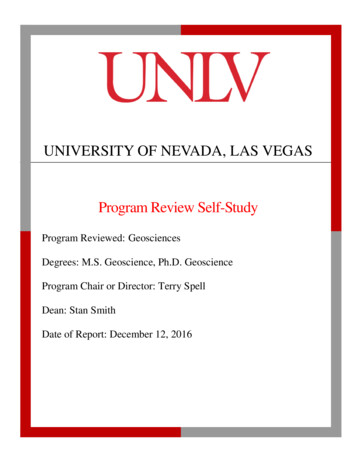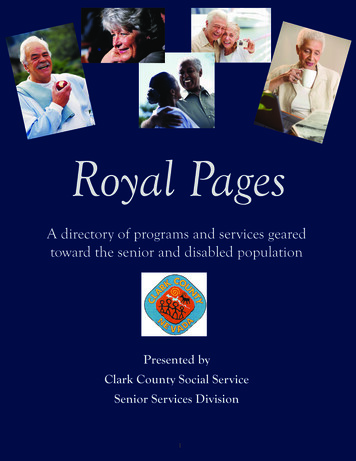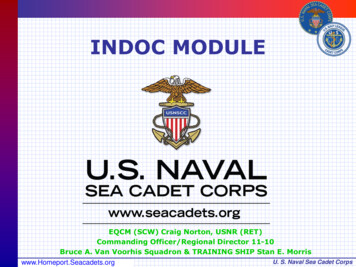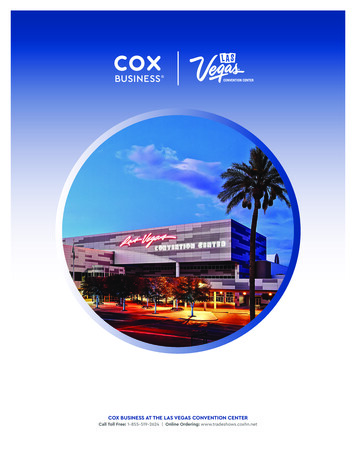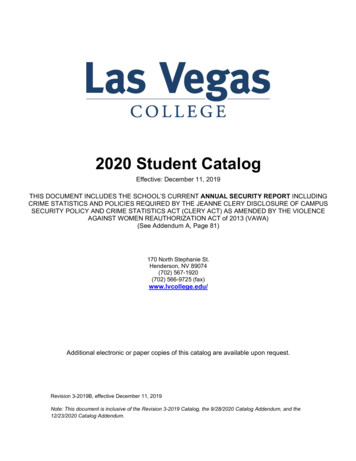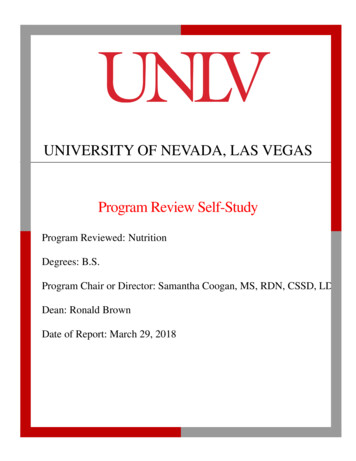
Transcription
UNIVERSITY OF NEVADA, LAS VEGASProgram Review Self-StudyProgram Reviewed: NutritionDegrees: B.S.Program Chair or Director: Samantha Coogan, MS, RDN, CSSD, LDDean: Ronald BrownDate of Report: March 29, 2018
Program Review Self-StudyAcademic Year 2017–19GENERAL INSTRUCTIONS1. Please provide Faculty CVs as a single electronic file (PDF preferred) or on a thumb drive for the externalreviewers.2. Please complete the program review self-study using this template.3. If this review is covering several degree levels, please be sure to address each level in your responses to thequestions.4. Contacts for questions:Chair of the Faculty Senate Program Review Committee found /program-review or the Chair of the Graduate College Program Review Committee found review-committee Dr. Rainier Spencer, Vice Provost for Academic Programs: rainier.spencer@unlv.edu, 702-895-5833 Nora Carroll, Academic Programs Analyst, Eleonora.carroll@unlv.edu, 702-895-1888I.Program DescriptionA. College/Department/Program1. College or School: Allied Health Sciences2. Unit: Department of Kinesiology & Nutrition SciencesWeb address: https://www.unlv.edu/kns3. Program(s) being reviewed: Didactic Program in Nutrition and Dieteticsa. Degrees and their abbreviations: Bachelor of Science in Nutrition Sciences (B.S. Nutrition Sciences)B. Primary individual completing this worksheet1. Name: Samantha Coogan, MS, RDN, CSSD, LD2. Title: Director, Didactic Program in Nutrition & Dietetics3. Date of self-study: April 20184. Campus Phone: 895-44785. Mail Stop: 30266. E-mail: samantha.coogan@unlv.edu7. Fax Number: 895-1500C. Other faculty involved in writing this report: Brian K. Schilling, PhD, CSCS, Kelly Webber, PhD, RD, LD,Laura Kruskall, PhD, RDN, CSSD, LD, FACSM, FAND, Arpita Basu, PhD, RD, LD, Tara Kenny, MS, RDN,LD, Sydney Spoon, MS, RDN, LD, Audrey Coffee, Allie IvarD. Please insert the most recent catalog description(s) of the program(s). Due to display complications, thisdescription must be typed into this form and not pasted from the Catalog.The Bachelor of Science in Nutrition Sciences degree is designed to prepare students with an interest in humannutrition to enter the health care field. Programs within Nutrition Sciences are student-focused with contact hoursprovided through lecture-based course, laboratory courses, and field experiences with practitioners. Summer andpart-time work or volunteer experiences in the profession are encouraged.1. Is the description correct? If not, what needs to be changed? YesII.Centrality to MissionA. Department/Program MissionWhat is the program’s mission statement (or the department’s if the program does not have one)?University of Nevada, Las VegasPage 2
Program Review Self-StudyAcademic Year 2017–19The mission of the UNLV DPND is to provide program graduates with the skills and knowledge to becomfortable and competent in their dietetic internship and serve as professionals capable of providing excellententry-level dietetic services in numerous community, food service, management, and clinical settings. Theprogram will provide an evidence-based curriculum that is clinical and communication focused, provides for avariety of practicum experiences, and promotes life-long learning, problem solving, and the effectiveness ofteamwork.B. Department/Program Mission AlignmentBriefly describe how this program is aligned to the mission of the University as described in the most recentmission statement, UNLV Mission https://www.unlv.edu/toptier/vision, and how it supports achievement of theinstitution’s mission:The UNLV DPND falls closely in line with UNLV’s Top Tier Mission as our program possesses a diverse facultyand student population. Currently, 56% of our student enrollment comes from an ethnically diverse group. Ourfaculty is diverse demographically and academically, with research experience on a broad spectrum (i.e. clinicaldietetics, community outreach, epidemiology, etc.). Our alumni remain heavily engaged in the program by actingas preceptors for the Community Nutrition course, and for the Dietetic Internship. We also have two alumniserving as part-time instructors within the department, and two more alumni serving as Graduate Assistants withinthe department.The DPND curriculum provides a clinical focus, research opportunities and an emphasis on chronic diseaseprevention, and is constantly work to evolve content delivery and innovate teaching methods. Within the studentorganization, SNDA, several of our students earn the Lisa Sherman Service Award through their heavyinvolvement within the Las Vegas community, as well as on campus.C. Core ThemesBriefly describe how this program supports UNLV’s Core Themes (the core themes can be foundat e Theme 1: Advance Student AchievementStudents within the DPND Program become leaders within the dietetic community well beforegraduation. Students in the program are motivated and engaged as evidenced by their strong performance inclasses and their various volunteer activities. The majority of our students go on to enter dietetic internships andbecome practicing dietitians. Many of our alumni are leaders in the field and current registered dietitians servingthe Las Vegas community. The addition of a Nutrition Masters Degree program in our department has furtherserved to motivate and engage our students in furthering their education and training.Core Theme 2: Promote Research, Scholarship, Creative ActivityWith the addition of Arpita Basu, students have been given greater research opportunities at a laboratorylevel, and for those interested in community outreach, students have the opportunity to work with Laura Kruskalland Kelly Webber in the area of food insecurity. Again, with the addition of the Nutrition Masters Degreeprogram, undergraduates understand the scope of research at a more mature (and necessary) level.By updating and advancing the curriculum yearly (per ACEND accreditation standards), our studentsreceive the most current information, technologies and informatics delivery. Our healthcare system changesconstantly, so we are sure to update our content to match the current needs of the field. It is with great hope thatthis program can partner with the UNLV Medical School in order to allow greater creative opportunities for ourstudents, and for them to become familiar with the physical space of a clinical setting well before they start aninternship.Core Theme 3: Create an Academic Health CenterUniversity of Nevada, Las VegasPage 3
Program Review Self-StudyAcademic Year 2017–19In 2012, the UNLV Nutrition Center was established on campus in the Rod Lee Bigelow Building inroom 212. Through this center, free classes were provided to UNLV faculty, staff, students, as well as, theunderserved population within the community. Classes included various topics, such as, Diabetes Management,Healthy Eating on a Budget, Cardiovascular Health, and a Sports Nutrition series. Monthly Grocery Store Tourswere also provided with incentives for participation. Classes and tours were facilitated by graduate assistants withsupervision provided by Dr. Laura Kruskall.Unfortunately, in 2017 the space allocated to the Nutrition Center was turned over to another department,so while the Nutrition Center is still in existence, it does not have a physical space for the time being. There areconversations about potentially moving the Nutrition Center to the Paradise Campus where the PsychologyDepartment formerly resided. Once a new space has been established, it will create greater research opportunities,allow for us to better promote the UNLV Food Pantry, give a space to the dietetic interns for studying andfeedback sessions, and give undergraduates more time to engage in the community and assist the department insupporting UNLV’s Top Tier Mission.Core Theme 4: Foster Community PartnershipsAlong with the UNLV Nutrition Center, the UNLV Food Pantry has provided a wonderful partnershipbetween the university and the Three Square Food Bank in which foods are picked up and delivered by ThreeSquare to the UNLV Food Pantry to disperse to UNLV faculty, staff and students who are in need. This project isa work in progress as we hope to expand the pantry hours, create more partnerships with other food assistanceprograms, and get students more involved in the delivery process.In addition to those above, we also have many community sites that allow for our students to shadow.They are able to shadow and volunteer at a variety of places, such as, food banks, food assistance programs, rehabcenters, wellness centers, private practice, acute care facilities, community gardens, cooperative extensionprograms, and some hospitals (as volunteers, not necessarily in dietetics, but hospital administration have grownto know our student population well).D. ExcellenceList and briefly describe five highlights or areas of excellence of the program:1) With the exception of the last academic year, the pass rate for the Registered Dietitian Exam fell between93% and 100%. This last year we fell to 81% (our program objective is 80%), as the RD Exam has recentlybeen updated, and the scores historically drop slightly within the first year of the update. The RD Exam isupdated every 5 years.2) In addition, most students and interns who transfer to the university wind up staying in Las Vegas to workwithin the community and/or clinically after seeing the vast diversity within this city. Although a smalldietetics community, job availability is high, even at a minimum at a per diem level, and most students findemployment within the first six months of completing the dietetic internship after graduation. Beyond that,our former students remain as preceptors to current students, assist in job searches for new graduates,continue to reach out to the department for job openings, and act as guest speakers with firsthand experiencegoing through this program then transitioning into the working world.3) Our department has recently taken over ownership of the UNLV Food Pantry, which has been heavilyincorporated into NUTR 315: Field Experience in Nutrition, an elective course offering. Through thiscollaboration, greater awareness of food insecurity right within our own campus has been brought to light.The UNLV Food Pantry works to serve UNLV students, faculty, and staff in need of food assistance. Inconjunction, our student organization has become heavily involved in this endeavor.4) Our student organization, the Student Nutrition and Dietetic Association (SNDA), has blossomedtremendously within the last two classes of graduates. The level of professionalism, involvement, andfortitude is ten-fold what it was even five years ago. There is an interactive, user-friendly website with aschedule, shop (which helps fund the organization), membership area, and so much more than was everoffered before. This is truly a testament to the character and quality of student that this program admits andproduces. The initiative taken by the students to elevate this organization has made them one of the mostUniversity of Nevada, Las VegasPage 4
Program Review Self-StudyAcademic Year 2017–19well-known student organizations on campus. They participate in Fitness4Finals, health fairs at the Pida Plazaand SRWC, and at multiple community sites within the city, such as, Three Square Food Bank.5) Hiring of two PhD-level faculty members, Dr. Basu and Dr. Webber, in August of 2017, has helped to elevatethe program with more opportunity for research experience for students, as well, as using their own researchexperience to create an added benefit to the classroom for the students. In addition, to speak to each of theircharacters, this program was very lucky to acquire two individuals who are so vested in student success, andwho have very much embraced the program’s goals, objectives and initiatives, and in the very short time theyhave been part of this program, have created significant suggestions/improvements, as well as respectingpractices that have worked for many years. Furthermore, the DPND Director role was finally made into apermanent position (full lecturer) in 2018, after three years of the position sitting on a visiting line. Thecurrent DPND Director, having been a former UNLV undergraduate student, UNLV graduate student, andUNLV intern, has institutional knowledge, from both a student and instructor position, teaching experience(starting as a GA), and familiarity with the Las Vegas community, which allows for greater support from thecommunity, implementation of new ideas as trends grow over time, and a solid sense of how UNLV hasgrown over the years.III.External Demand for ProgramA. Stakeholders1. Who are the main local and regional stakeholders of your educational programs, i.e., employers and entitiesbenefiting from these programs, hiring the graduates, or admitting them to graduate and/or professionalprograms?The UNLV Graduate College, the Department of Kinesiology & Nutrition Sciences, the Department ofCommunity Health, the Department of Public Health, the Sunrise Health System (Sunrise Hospital Southern HillsHospital, Mountainview Hospital, Sunrise Children’s Hospital), Dignity Health System (St. Rose Hospitals, WIC,Barbara Greenspun Womens Center of Excellence), the Valley Health System (Summerlin Hospital, DesertSprings Hospital, Henderson Hospital, Spring Valley Hospital, Centennial Hills), University Medical Center,Horizon Specialty Hospital, Horizon Specialty Hospital with Mountains Edge Hospital, Veteran Affairs ofSouthern Nevada Healthcare System, Families for Effective Autism Treatment, Aids for Aids of Nevada, ThreeSquare Food Bank, Lutheran Social Services of Nevada, Create a Change Now, Dominate Your Game, The FoodConnection/IHW, Anderson Dairy/CA-NV Dairy Council, CA-NV Beef Council, Southern Nevada HealthDistrict, American Heart Association, Children’s Heart Center, University of Nevada Cooperative Extension, theClark County School District, the UNLV Preschool, UNLV Nutrition Center, UNLV Rebel Wellness Zone andUNLV Cares Food Pantry.2. What are specific stakeholder needs for graduates?Stakeholder needs include proficiency in medical nutrition therapy (chronic diseases/conditions and how toassess, diagnose, treat, monitor and evaluate outcomes), minimally competent levels of patient/client counselingin regards to behavior change, motivational interviewing and building/maintaining rapport, formulas related totube feeding and intravenous nutrition (nutrition support), flexibility in scheduling and ability to deliver content,innovation in teaching and program development, effective means of program implementation, and competency inassessment, evaluation and monitoring tools.B. Needs for Graduates and Future Plans1. What are the anticipated needs for program graduates over the next 3-5 years? Please cite sources ofinformation.University of Nevada, Las VegasPage 5
Program Review Self-StudyAcademic Year 2017–19As the program grows, and the job market becomes more competitive, it will be imperative for undergraduates tohave exposure to clinical settings. As it stands, placing undergraduates in the community setting has not been toodifficult, however, many students do not see a hospital for the first time until they start a dietetic internship. Theseundergraduates need to be familiar with the inner workings and policies of various hospitals well beforegraduation in order to fully understand the scope of the field in which they will eventually become employed.Many students are often shocked by what they see and learn during an internship, so in the classroom,improvements have been made to improve those expectations, but hands-on experience will only enhance theirlearning experiences, and help them recognize where they may or may not want to take their careers. Badging hasbeen an issue in the past, but with the help of the Medical School, this issue may be possible to rectify.2. What changes to the program will those require?Badging requirements and affiliation agreements will have to be streamlined in order to place several studentsover the semester into various clinical settings, both in- and out-patient. Again, we hope that the UNLV MedicalSchool will allow us to place undergraduates more fluidly as there has been interest from both programs in doingso.C. Success of Graduates1. What steps does the department take to facilitate the success of graduates (e.g., internships, career fairs,employment talks, etc.)?The UNLV Nutrition Sciences program offers a 7-month long, dietetic internship consisting of 1200supervised practice hours, as is required by the Accreditation Counsel on the Education of Nutrition & Dietetics(ACEND). This program is completely separate from the didactic program; however, the didactic program fullyprepares its graduates for eligibility for application of a dietetic internship, per ACEND accrediting standards.Successful graduates, maintaining a minimum GPA of 2.75 and no grade lower than “C” in all upper divisionNUTR courses, will earn an ACEND-approved verification statement, which has a 5-year expiration date.Based on employer feedback for entry-level employees to be better prepared entering the workforce, theUNLV Nutrition Sciences program was recently approved for a Masters Degree concentration in NutritionSciences (approved May 2017), that allows for students to further their dietetics education, creating morecompetent/experienced entry-level employees.Currently, 80-100% of UNLV graduates are matched into an internship, either here at UNLV, or atanother supervised practice program across the country. Completion of supervised practice is required forcandidates to move on to take the Registered Dietitian (RD) Board Exam, a requirement for the RDN credential tobecome a registered, practicing dietitian nutritionist. For those who are not matched, or choose not to apply tosupervised practice, there is an alternate pathway known as the NDTR (Nutrition and Diet Technician Registered)Pathway III, in which applicants submit an official transcript, NDTR Misuse Agreement form, and a VerificationStatement from an accredited DPND program in order to take the NDTR Board Exam to practice in the foodservice sector of dietetics in a hospital setting.Our DPND program prepares program graduates for both pathways listed above per ACENDaccreditation standards2. Discuss the placements of recent graduates:Graduates are often offered employment before their internships even end based on the work they completedwith sites/stakeholders during their internship rotations. Graduate placement includes; Aids for Aids ofNevada, the Southern Nevada Health District, various hospitals within the valley, WIC, The FoodConnection, private practice, Medtronic, along with several obtaining specialty credentials (i.e. CDE –Certified Diabetes Educator, CSSD – Certified Specialist in Sports Dietetics, etc.) which make thesegraduates even more marketable and reliable within the field.University of Nevada, Las VegasPage 6
Program Review Self-StudyAcademic Year 2017–193. If the department or program does not have placement information on graduates, what is the plan to implementgathering that information?We are continually trying to obtain better metrics in a more effective manner. Given the small size of ourdietetics community, we reach out to graduates often as guest speakers and to act as preceptors, which allowsfor us to gather information on employment. However, a survey system to be sent out yearly could be quiteeffective in tabulating employments rates, duration of employment, and growth patterns. This would also bebeneficial to gather information for graduate degrees (completed and in progress) and specialty credentialmaintenance.A realistic plan to better capture graduate placement and outcomes is to implem
University of Nevada, Las Vegas Page 4 In 2012, the UNLV Nutrition Center was established on campus in the Rod Lee Bigelow Building in room 212. Through this center, free classes were provided to UNLV faculty, staff, students, as well as, the underserved population within the community. Class

